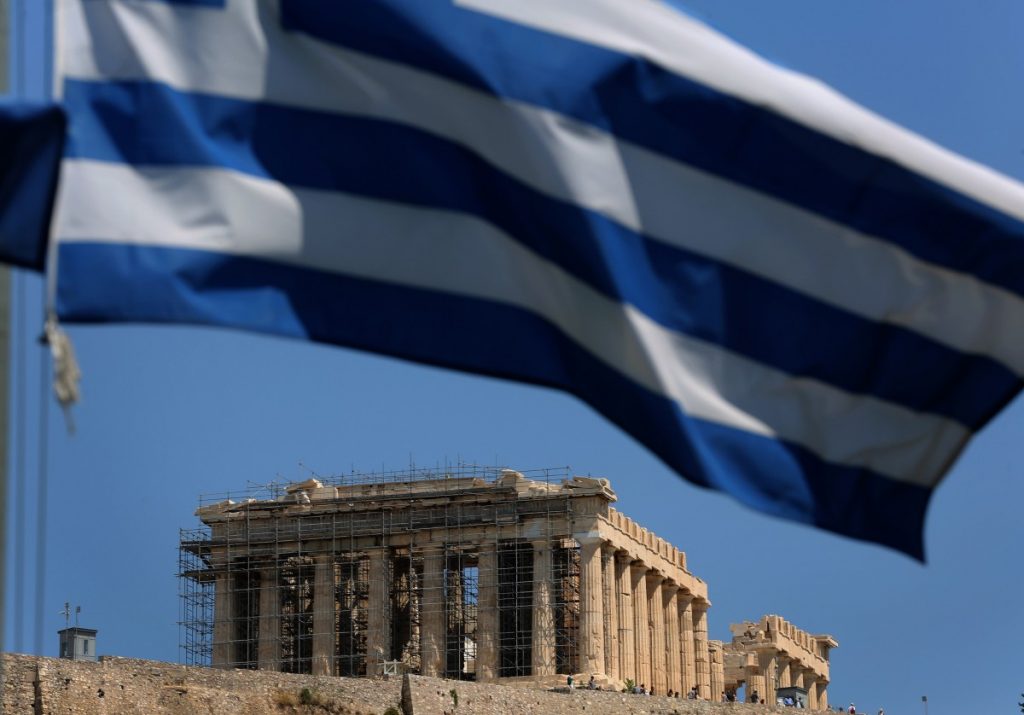
#Tags:
NabuccoTAPShah DenizReutersΟ TAP επικρατεί του Nabucco στον «πόλεμο των αγωγών»;
Σε μια ενδιαφέρουσα ανάλυση – ρεπορτάζ για την «μάχη των αγωγών» που θα κρίνει το μέλλον της ενεργειακής τροφοδοσίας της Ευρώπης και τον βαθμό απεξάρτησης από του ρωσικούς υδρογονάνθρακες, το διεθνές ειδησεογραφικό πρακτορείο Reuters υποστηρίζει, ότι το σχέδιο για τον αγωγό TAP (Trans-Adriatic Pipeline) δείχνει ιδιαίτερη δυναμική, τέτοια που θα μπορούσε να οδηγήσει σε εγκατάλειψη τα σχέδια για την προτίμηση που έδειχνε η Δύση επί πολλά έτη για τον ανταγωνιστικό αγωγό Nabucco.
Η ανάλυση δίνει και τη γεωπολιτική, όχι μόνο την οικονομική διάσταση του θέματος. Το Αζερμπαϊτζάν φέρεται να βρίσκεται κοντά στην τελική απόφαση για το ποιον αγωγό θα επιλέξει για τις μελλοντικές του εξαγωγές προς τη Γηραιά Ήπειρο από το γιγαντιαίο κοίτασμα Shah Deniz, το οποίο διαχειρίζεται κοινοπραξία με τη συμμετοχή της πολυεθνικής BP και της αζέρικης κρατικής Socar.
Ο ενεργειακός αναλυτής της εταιρίας συμβούλων HIS, Andrew Neff, θέτει το ερώτημα εάν ο Nabucco είναι βιώσιμος αν τελικά κατασκευαστεί ο ρωσικός South Stream. Στο ρεπορτάζ καταγράφεται η αλλαγή στάσης που παρουσιάζεται από την πλευρά της Ευρωπαϊκής Ένωσης, η οποία από την ξεκάθαρη υποστήριξη της κατασκευής του Nabucco φέρεται να έχει υιοθετήσει στάση ουδετερότητας, δηλώνοντας ότι και οι δυο αγωγοί δεν την προβληματίζουν, είτε κατασκευαστεί ένας εξ αυτών είτε και οι δυο.
Ο διευθυντής εξωτερικών σχέσεων του ΤΑΡ δηλώνει ότι «υπάρχει δραματική στροφή», ενώ ο εκπρόσωπος του Nabucco εκτιμά ότι το συγκεκριμένο ενεργειακό επενδυτικό σχέδιο εξακολουθεί να απολαμβάνει ισχυρής πολιτικής στήριξης.
Όπως φαίνεται από δηλώσεις ειδικών και οι δυο αγωγοί έχουν τα θετικά και τα αρνητικά τους, με τον TAP να είναι κατά 500 εκατομμύρια δολάρια φθηνότερος του Nabucco, το κόστος του οποίου είναι κατά κάτι μικρότερο των 8 δισεκατομμυρίων δολαρίων, με τον δεύτερο όμως να φέρεται πως εξασφαλίζει την πρόσβαση σε περισσότερες αγορές.
Ενδιαφέρον παρουσιάζει η εκτίμηση του Reuters που υποστηρίζει ότι τα συμφέροντα του Αζερμπαϊτζάν εξυπηρετούνται καλύτερα από τον TAP, αφού παρά τον ακραιφνώς «φιλοδυτικό» προσανατολισμό του Nabucco που ευθυγραμμίζεται με την γενικότερη στάση του Μπακού, οι Αζέροι δεν έχουν κανένα συμφέρον να διαρρήξουν τις σχέσεις τους με τη Ρωσική Ομοσπονδία, κάτι που είναι κατανοητό (η σύγκρουση για το Ναγκόρνο Καραμπάχ με την Αρμενία όπου σταθμεύουν ρωσικές δυνάμεις είναι ένα μόνο από τα θέματα που τους απασχολούν).
Ωφελημένες, σύμφωνα πάντα με το Reuters, θα ήταν και οι χώρες του ευρωπαϊκού νότου, κυρίως λόγω των εσόδων που θα συνεπαγόταν η διέλευση του αγωγού από χώρες που βρίσκονται εν μέσω οικονομικής κρίσης, που θα εξασφάλιζε και τη συναίνεση της Γερμανίας που επιθυμεί τη μείωση του κόστους διάσωσης χωρών της Ευρωζώνης.
Το κείμενο στα αγγλικά ακολουθεί:
Europe, U.S. support for Nabucco weakened
* Azeri consortium expected to pick winner in June
* Gas due to flow to European Union from 2019
By Georgina Prodhan and Barbara Lewis
VIENNA/BRUSSELS, May 28 (Reuters) – Europe’s grand plan for a gas pipeline from the Caspian Sea that would make its eastern states less reliant on Russia may have been fatally undermined by Russia’s even bigger project.
As Azerbaijan nears a decision on which pipeline to choose for its future exports, the Nabucco plan that was long the European Union favourite could lose out to the more modest Trans Adriatic Pipeline (TAP) across Greece to southern Italy.
In a complex equation based on politics as much as economics, TAP is in the ascendancy over the Nabucco pipeline to Austria in the face of Russia’s $39 billion South Stream plan.
“The question is: ‘Is Nabucco viable if South Stream is built?'” said Andrew Neff, Moscow-based principal energy analyst with research firm IHS.
The decision between TAP and Nabucco is expected in June from partners in the Shah Deniz consortium, led by gas field operator BP and Azeri state energy company Socar.
The European Union won’t have a direct say in the choice, but its recent switch to “project neutrality” from support for Nabucco could make a big difference. It now says it would be happy with either pipeline or even both.
“There has been a dramatic shift,” TAP’s External Affairs Director Michael Hoffmann told Reuters.
Nabucco spokesman Christian Dolezal, however, said his project retained strong political support.
OPERA
Europe’s original plan was one 3,900 km (2,400 mile) pipeline all the way from Azerbaijan, across Turkey and up through the Balkans. It was named Nabucco after the epic Verdi opera, with its rousing chorus, that the founding parties had listened to at the Vienna opera house in 2002.
Although the plan, led by Austria’s OMV, was scaled back to a 1,300 km (800 mile) version linked to a Turkish pipe, it had kept the favour of both Brussels and Washington.
That was not least because ‘Nabucco West’ would cross former eastern bloc countries that depend the most on Russia for energy – even though initial Azeri gas supplies will account for a mere 2 percent of EU needs.
The TAP pipeline is only 800 km (500 miles), including a stretch under the sea to southern Italy. Its shareholders are led by Swiss AXPO and Statoil, which has a stake in the Azeri gas fields.
The business case for the two appears relatively balanced.
Nabucco would be estimated to cost less than $8 billion with one Azeri expert reckoning TAP would be $500 million cheaper, but Nabucco might bring access to more markets.
“Both have advantages and disadvantages,” said Gulmira Rzayeva, a leading research fellow at the Center for Strategic Studies under the President of the Republic of Azerbaijan.
All of which makes the politics even more important.
EXPEDIENT
Choosing TAP, which does not cut through territory that Russia traditionally dominated, could be politically expedient for Azerbaijan, which is broadly aligned with the West but has no interest in conflict with its former Soviet overlord.
Russia began building South Stream in December and hopes to deliver gas to Europe well before 2019, when the Azeri gas is due to start flowing to the European Union..
The Gazprom-led 2,500 km (1,500 mile) South Stream will cross the Black Sea and then closely follow the line of Nabucco West. Plans for a southern route that could have competed with TAP were scrapped, another boost for Nabucco’s rival.
Southern European states see benefits for themselves too.
Italy, which relies for gas on politically unstable North Africa as well as Russia, is keen to diversify supply.
Struggling to recover from its debt crisis, Greece would welcome the additional revenue from the pipeline. Influential Germany would be happy with anything that strengthens Greek finances and reduces potential future bailout costs.
The Trans Adriatic Pipeline would have the side benefit of forcing greater cooperation between old rivals Greece and Turkey, EU diplomats said.
Bulgaria and Romania, the poorest European Countries, would appreciate the infrastructure investments if Nabucco were built.
But their economies do not face the immediate pain that Greece’s does – and a South Stream pipeline through Bulgaria, Serbia, Hungary and Slovenia would also bring economic benefits even though it would not break Russia’s dominance.
Washington is less concerned about the pipeline supply route to NATO allies than it was given the change in the global energy picture as a result of the U.S.-led shale gas boom and the increasing importance of liquefied natural gas, which can be shipped by sea.
In fact, the emergence of those alternative gas supplies has raised debate about whether long pipelines which tie end users into relatively expensive contracts can be justified by the economics alone.
http://www.reuters.com/article/2013/05/28/eu-gas-idUSL6N0E41JX20130528

